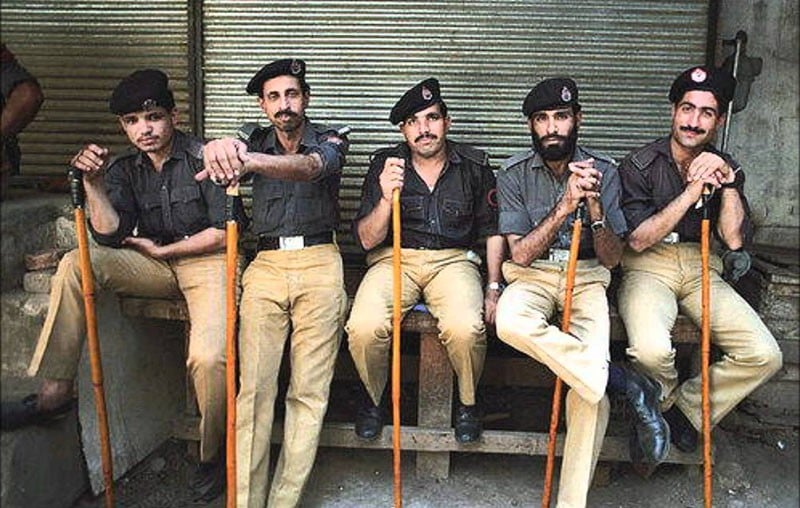
The recent wave of terrorist attacks on police personnel calls for urgent reforms in the existing police system

Grim law and order situation has become a potent threat to the democratic state of Pakistan. Over the years, it is spending huge funds on police, yet the masses suffer from a creeping sense of insecurity in every province. Often the endeavours undertaken to transform the system failed to restore public trust -- one of the foremost objectives of the police force.
The recent wave of terrorist attacks on police personnel in Khyber Pakhtunkhwa and Balochistan calls for urgent reforms in the existing police system. Police is considered as an agent to protect and promote the interests of the influential and political executives. It cares less for implementing rule of law and ensuring safety and security of the masses.
These perceptions are, however, not without reasons. One of the foremost reasons is the promulgation of outdated 1861 Police Act in the post-1947 period. The Act was designed by the British government to protect its interests and maintain law and order in the aftermath of 1857 War of Independence. It was a colonial act aimed to control masses using some brutal methods. Its implementation after independence in Pakistan affected the system and performance of police. It failed to change the basic nature of the system. The continuation of that draconian act influenced the general psyche in the initial days after independence. Consequently the system failed to earn sympathy and support of the people.
In the post-2002 Police Order scenario, the federal and provincial governments invested large amounts to reform the policing culture. Infrastructure and capacity building projects were launched to meet the challenges of an efficient police system.
At the federal level, Automated Fingerprint Identification System (AFIS) was initiated in 2006 through which a centralised fingerprint database was set up at FIA Headquarter in Islamabad. Another scheme of Police Record and Office Management Information System (PROMIS) was started to enhance its effectiveness and to provide online connectivity to police all over Pakistan. To modernise its communication system, a Nationwide Integrated Trunk Radio System (NITRS) was developed. It aimed to provide reliable and technologically advanced communication facilities to police in all the provinces.
In 2013, a plan of conversion of "B" areas into "A" areas was started in Balochistan with the help of federal government. The scheme was, however, abandoned due the opposition of some Baloch sardars. A well-equipped National Forensic Science Agency (NFSA) was created to improve the overall quality of its investigation.
Under the Police Order 2002, the provinces were empowered not only to make rules but also to amend the Police Order itself with the prior approval of the prime minister. It would enable the police executives in every province to meet their specific needs and requirements. Presently the challenges facing by the police are enormous which need quick response and a robust strategy.
A great deal of confusion exists about a standardised legal framework. Going for varied and fragmented police laws will only reduce the chances of integrating it with the public needs. It is the time to devise proper laws with the consensus of all the provinces and the federal government.
Keeping in view the need to upgrade its competence, provinces also established modern laboratories, quick command and control systems and various schools for specialised trainings.
With the technical assistance of the Turkish National Police, a command and control system was set up in Lahore. The Punjab government is also utilising other sources for the capacity building of its police force.
Khyber Pakhtunkhwa has established various training schools i.e. Police School for Investigation, Police School of Intelligence, Police School of Public Disorder and Riot Management and many others. A number of forensic labs were established in Sindh that are designed to recover lost digital files.
The government of Khyber Pakhtunkhwa has taken the lead to reduce dependence on the federal government resources. It has introduced a provincial police service that aimed to induct provincial officers in the police department and to increase their capacity through research and analysis. IG KP Nasir Khan Durrani has presented before the provincial government a draft bill for legislation to reform police system of the province. It appears to be a comprehensive piece of reforms in the archaic system. The bill aims to make police accountable before public institutions rather than before a few individuals in the bureaucracy. It introduced a mechanism of check and balance in the system through public participation at all levels.
In the past, police reforms have primarily remained a federal subject. The emphasis was to increase numerically the strength of the police force instead of professional progression. Due to the complicated law and order challenges, the federal government and provinces should develop a wide-ranging mechanism to have a uniform police law and a standardised recruitment policy. Being the supreme authoritative body, the centre should play its role as a regulatory entity with enhanced coordination.
Pakistan needs to adopt democratic policing principles which were introduced in the ‘Youngstown Accord’ in USA specifically designed for Bosnia Herzegovina. Under this system, police must operate within the democratic parameters, its conduct must be governed by sound professional code and its highest priority must be the protection of lives. It ensures community engagement and the protection of public lives and property must be its prime objectives.